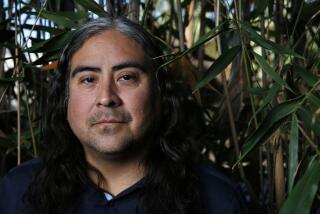Sole American Pianist Fails to Make Final Cliburn Round
- Share via
SAN DIEGO — Kevin Kenner, the sole American semifinalist in the quadrennial Van Cliburn International Piano Competition in Ft. Worth, Tex., failed to make the list of six finalists who will now compete for the contest’s prestigious gold medal.
Judges deliberated into the early morning of June 7, selecting all three semifinalists from the Soviet Union--Elisso Bolkvadze, Alexander Shtarkman and Aleksei Sultanov--as well as Italy’s Benedetto Lupo, Brazil’s Jose Carlos Cocarelli and China’s Ying Tian.
In a telephone interview Monday, the day before Kenner played his semifinalist solo recital, the 26-year-old pianist from Coronado exuded equanimity. From his casual tone of voice, one would think he was spending a week’s vacation with an indulgent great aunt. Only one thing ruffled his feathers.
“Some of the press accounts have referred to me as a ‘competition veteran,’ ” Kenner complained. “That really upsets me, because for the record, I do not enjoy them.”
From his resume, however, it would be easy to infer that Kenner has a real penchant for entering and winning competitions. Last year he won the Mozart and contemporary music prizes at the Gina Bachauer International Competition, and in 1987 he won the grand prize in the New York Chopin International Competition. Prior to the opening of the Van Cliburn Competition on May 27, Kenner and four other pianists were announced as the winners of the 1990-92 Affiliate Artists Xerox Pianists Program.
If Kenner does not enjoy the pressure of competitions, however, he realizes they are a kind of necessary evil in the music business.
“Every performance I’ve given in the last few years has been the result of winning some competition,” he said.
He acknowledged that Leon Fleischer, his current mentor at Baltimore’s Peabody Conservatory, has not particularly encouraged his competition fever.
“Entering the Van Cliburn Competition was my own idea after the Gina Bachauer. Since you need to have your teacher sign a form to enter the Van Cliburn, I brought the paper into Fleischer’s office one day, covered the top half and said, ‘Here, sign this!’ ”
Although Fleischer may not have been an enthusiastic promoter of the competition route, Kenner noted, in a totally respectful manner, that Fleischer himself had won the Leeds International Competition early in his career.
Having made the Van Cliburn Competition semifinals, Kenner obviously impressed the Ft. Worth jury with his initial pair of recitals. But Kenner was rather hard on himself.
“My playing in the preliminary round was solid, but after those performances, I was really disgusted with myself--mainly over missed notes.”
On one of his opening recitals, Kenner played Alban Berg’s infrequently performed Piano Sonata, Op. 1, a daunting, early Expressionist essay that is not the typical flashy competition showpiece.
“I chose the Berg because, in one sense, it can say a lot about the player. The sonata’s material is so rich; it has a high emotional content, yet there is also a certain cerebral organization behind it.” Kenner speculated that it was better to go out on a limb with a work like the Berg sonata and show some individuality than to remain in the safe, familiar boundaries of Chopin, Liszt and Rachmaninoff.
If Kenner’s initial performances at the Ft. Worth competition disappointed the self-critical musician, his first performance in the semifinal rounds on Saturday, where he played Brahms’ F Minor Piano Quintet with the members of the Tokyo String Quartet, left him exhilarated.
“The Brahms went very well. Tokyo is a great quartet to work with, and I felt a great deal of electricity at the keyboard. In the second movement, I experienced one of those rare moments of ecstasy. Also, the performance was well received by the audience. They gave us a standing ovation and gave me four curtain calls.”
Kenner, a California native, grew up in Coronado, where his parents and his three married sisters still live. He graduated from Coronado High School, although during his high school years he commuted to San Diego City College to take courses in music theory. His primary piano teacher here was Krzysztof Brzuza, a Polish emigre who, Kenner said, still teaches privately in La Mesa.
“He was really an incredible teacher. I would take a total of six hours of lessons every week from him. He developed my technique--the physical apparatus of making the fingers work--through years of studying the Chopin Etudes. I owe my affinity for Chopin’s music to his teaching.
“He especially developed the sense of tone quality that belongs to this music. I noticed this typically Eastern European characteristic when I performed last year at the Seventh International Chopin Festival in Antonin, Poland. It’s something most American players don’t work for.”
As a result of winning the 1987 New York Chopin Competition, Kenner played a recital tour in Poland in September. As he expressed his debt of gratitude to his Polish mentor, Kenner noted that, although Brzuza was a brilliant teacher, he was unable to get a teaching position locally because he did not possess an American university degree.
Kenner has just completed his formal studies at the Peabody Conservatory. Because of his participation in the Van Cliburn Competition, he missed Peabody’s graduation exercises, where he was to have received his master’s degree and his Artist’s Diploma.
More to Read
The biggest entertainment stories
Get our big stories about Hollywood, film, television, music, arts, culture and more right in your inbox as soon as they publish.
You may occasionally receive promotional content from the Los Angeles Times.










